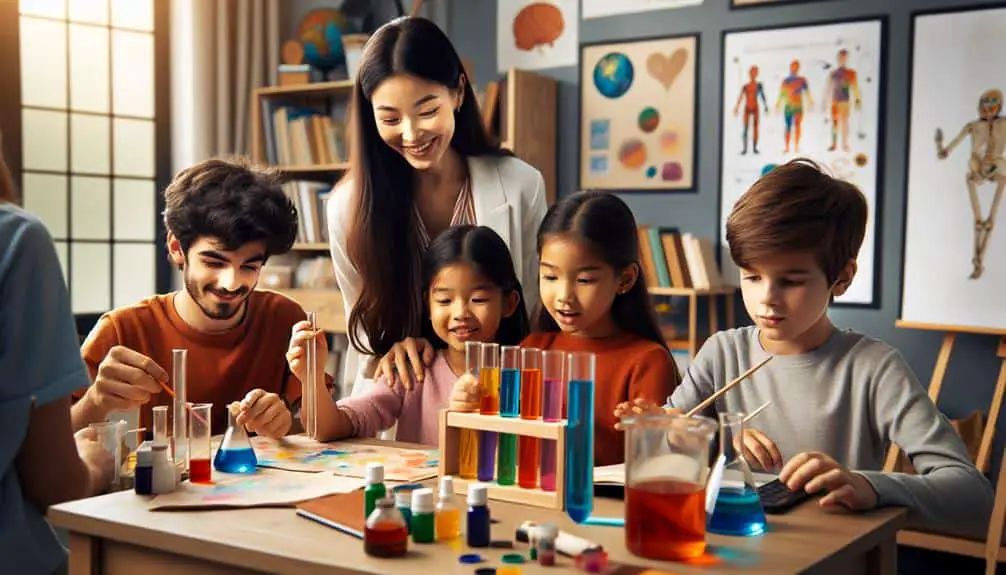To promote collaboration among gifted homeschool students, utilize technology like online forums and video chats. Implement group projects with clear goals, timelines, and roles. Encourage peer-to-peer learning through mentoring and cooperative tasks. Set up virtual study groups for flexible sharing of knowledge. Develop communication skills through active listening and virtual meetings. Foster teamwork and problem-solving with exercises and collaborative projects. These strategies cater to gifted students' advanced needs. Further information on implementing these tactics effectively is available in the detailed research provided.
Key Points
- Implement clear objectives, timelines, and roles.
- Utilize brainstorming and mind mapping techniques.
- Foster peer mentoring and cooperative learning.
- Create virtual study groups with flexible scheduling.
- Encourage communication through active listening and group projects.
Understanding Gifted Homeschoolers' Needs
To effectively promote collaboration among gifted homeschool students, it's essential to first understand their unique academic and social needs. Gifted homeschoolers often face academic challenges due to the need for more advanced coursework that caters to their intellectual abilities. Providing them with challenging material is essential for their growth and development. Additionally, these students may require emotional support to navigate the pressure that comes with being gifted.
Social interactions play an important role in the development of gifted homeschoolers. Encouraging community engagement through group projects, extracurricular activities, or field trips can foster a sense of belonging and provide opportunities for collaboration.
These interactions not only enhance their social skills but also provide a platform for sharing knowledge and ideas with peers who understand their academic pursuits.
Leveraging Technology for Collaboration
Utilizing online platforms and digital tools can greatly enhance collaboration opportunities for gifted homeschool students. In today's digital age, leveraging technology is essential for fostering collaboration among students who are homeschooled. By incorporating various online forums, video chats, collaborative tools, and social media platforms, gifted students can engage in meaningful interactions, share ideas, and work together on projects regardless of physical distance.
Here are three key ways technology can be leveraged for collaboration:
- Online Forums: Gifted homeschool students can participate in online forums dedicated to specific subjects or interests, where they can exchange thoughts, ask questions, and learn from each other.
- Video Chats: Platforms like Zoom or Skype enable students to have real-time discussions, brainstorm ideas, and work on projects as if they were in the same room.
- Collaborative Tools: Using tools like Google Docs, Trello, or Slack allows students to collaborate on assignments, share resources, and track progress efficiently.
Implementing Group Projects Effectively
When establishing effective collaboration among gifted homeschool students, a key aspect to take into account is the implementation of group projects that foster teamwork and shared learning experiences. Project management plays an essential role in ensuring the success of group projects. It involves outlining clear objectives, assigning roles based on individual strengths, setting timelines, and monitoring progress to keep the project on track. Utilizing project management tools can aid in organizing tasks and facilitating communication among group members.
Brainstorming sessions are another important component of implementing group projects effectively. Encouraging students to share ideas freely and engage in creative thinking can lead to innovative project concepts. Setting aside dedicated time for brainstorming allows for the exploration of different perspectives and the development of diverse solutions to project challenges.
Additionally, incorporating brainstorming techniques such as mind mapping or round-robin brainstorming can enhance the collaborative process and inspire collective creativity among gifted homeschool students. By focusing on project management and fostering effective brainstorming sessions, educators can promote collaboration and meaningful learning experiences within group projects.
Encouraging Peer-to-Peer Learning
Encouraging collaboration through peer-to-peer learning enhances the educational experience for gifted homeschool students, fostering a dynamic environment for knowledge sharing and skill development.
Peer mentoring allows students to teach and learn from each other, building a supportive network that nurtures academic growth.
Cooperative learning strategies, where students work together towards a common goal, promote teamwork and critical thinking skills.
Collaborative projects provide opportunities for students to combine their strengths, fostering creativity and innovation through shared ideas and perspectives.
Group discussions offer a platform for students to engage in intellectual discourse, enhancing their communication skills and broadening their understanding of diverse viewpoints.
- Peer mentoring facilitates knowledge exchange and skill enhancement.
- Cooperative learning cultivates teamwork and critical thinking abilities.
- Collaborative projects foster creativity and innovation through shared ideas.
Creating Virtual Study Groups
Creating virtual study groups can greatly enhance collaboration and learning outcomes for gifted homeschool students. Online forums and virtual meetups provide platforms for students to connect, discuss challenging topics, and support each other's learning. By pairing up with study buddies or participating in group assignments virtually, students can benefit from diverse perspectives, share knowledge, and develop critical thinking skills.
Virtual study groups offer flexibility in scheduling, allowing students to coordinate based on their availability. This can be especially beneficial for homeschool students who may have varying routines. Additionally, the digital nature of these groups can transcend geographical barriers, enabling students from different locations to come together and exchange ideas.
Through virtual study groups, students can enhance their communication skills, learn to work collaboratively, and gain a deeper understanding of the subject matter. This mode of collaboration fosters a sense of community among gifted homeschool students, providing a supportive environment for academic growth and success.
Fostering Communication Skills
To enhance communication skills among gifted homeschool students, consider incorporating active listening techniques into their learning experiences. Encouraging practices such as summarizing, paraphrasing, and asking clarifying questions can help students engage more effectively in discussions.
Additionally, providing group project opportunities can further foster collaboration and strengthen their ability to communicate ideas clearly and cohesively.
Active Listening Techniques
By actively engaging in listening techniques, gifted homeschool students can enhance their communication skills and foster collaboration with their peers. Reflective listening allows individuals to paraphrase and repeat what they've heard, showcasing understanding and validating the speaker's words.
Empathetic communication involves not just hearing but truly understanding the emotions and perspectives behind the words spoken, fostering deeper connections.
Mindful engagement encourages students to be fully present and attentive during conversations, reducing misunderstandings and enhancing the quality of interactions.
Open dialogue creates an environment where students feel comfortable expressing their thoughts and ideas freely, leading to more meaningful exchanges.
Group Project Opportunities
Engaging in group project opportunities fosters the development of communication skills among gifted homeschool students. Remote collaboration through project-based tasks offers a platform for students to enhance their ability to convey ideas effectively.
Team assignments provide an avenue for students to practice articulating their thoughts, actively listening to peers, and offering constructive feedback. Virtual meetings within group projects encourage students to communicate clearly, both verbally and in written form, fostering collaboration and understanding amongst team members.
Research shows that participating in group projects helps students refine their communication skills by engaging in discussions, sharing perspectives, and negotiating differing viewpoints. These interactions provide valuable lessons in effective communication, such as expressing ideas cohesively, actively participating in conversations, and working collaboratively towards a shared goal.
Through group project opportunities, gifted homeschool students not only develop their communication skills but also learn to navigate the dynamics of teamwork, contributing to their overall growth and success in collaborative settings.
Promoting Teamwork and Problem-Solving
Encouraging collaboration among gifted homeschool students cultivates a dynamic environment that fosters teamwork and enhances problem-solving skills.
To promote teamwork and problem-solving effectively, consider incorporating the following strategies:
- Teamwork exercises: Engage students in activities that require them to work together towards a common goal, emphasizing the importance of communication, delegation, and cooperation.
- Problem-solving activities: Introduce tasks that challenge students to think critically and creatively, encouraging them to explore different solutions and approaches collaboratively.
- Collaborative projects: Assign group projects that necessitate students to combine their individual strengths and expertise to achieve success, fostering a sense of collective achievement and mutual support.
Frequently Asked Questions
How Can Parents Identify Giftedness in Homeschooled Children?
To identify giftedness in homeschooled children, observe advanced skills, intense curiosity, and exceptional memory. Tailor curriculum to challenge and engage. Utilize assessments, seek professional evaluations, and encourage a variety of enriching experiences to support their development.
What Are the Best Virtual Platforms for Collaboration Among Gifted Homeschool Students?
When seeking virtual platforms for collaboration among gifted homeschool students, prioritize interactive forums and online study groups. Engaging in virtual workshops fosters teamwork and innovation, while collaborative projects enhance critical thinking skills. Remember, "Many hands make light work."
Are There Specific Strategies to Ensure Equal Participation in Group Projects?
To guarantee equal participation in group projects, employ participation strategies that encourage inclusive projects. Utilize effective teamwork techniques to enhance group dynamics and foster collaboration among gifted homeschool students. These approaches can promote engagement and equal contribution.
How Can Parents Encourage Gifted Students to Take on Leadership Roles?
To encourage gifted students to take on leadership roles, parents should nurture independence by allowing autonomy in decision-making, and foster creativity by providing opportunities for innovation. By empowering them, you can help cultivate their leadership skills effectively.
What Role Do Extracurricular Activities Play in Fostering Collaboration Among Gifted Homeschoolers?
In fostering collaboration among gifted homeschoolers, extracurricular activities like team sports, music groups, debate clubs, and science competitions provide structured platforms for students to interact, communicate, and work together towards common goals, enhancing their social skills and teamwork abilities.



